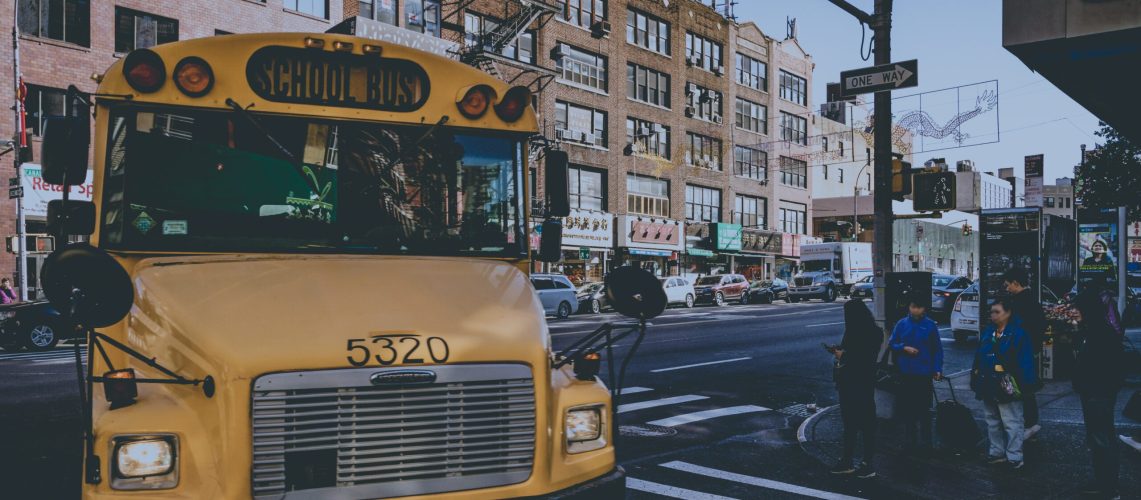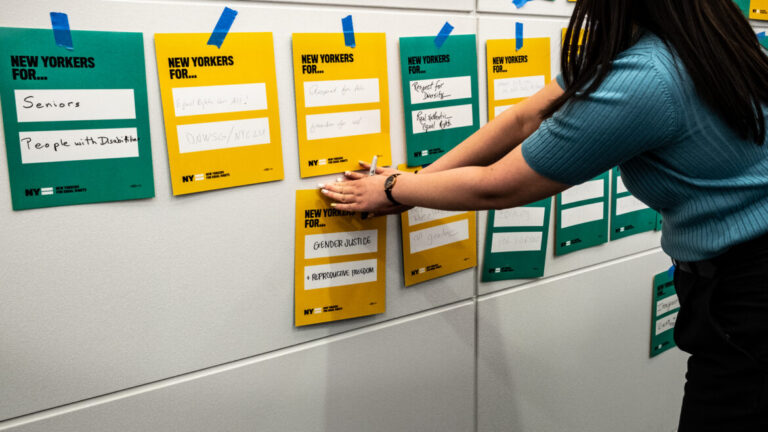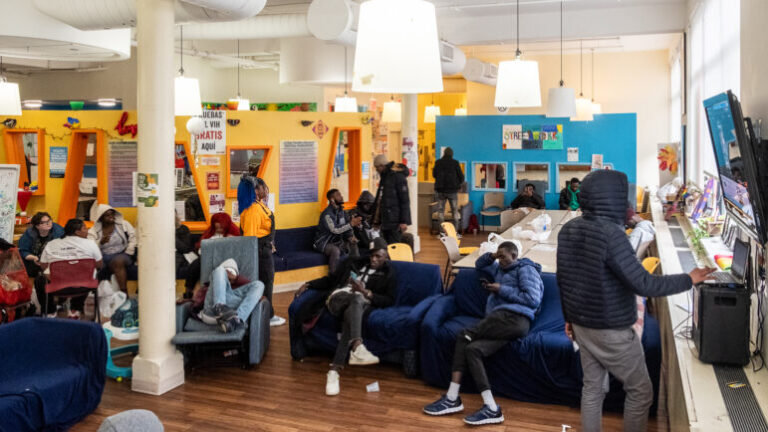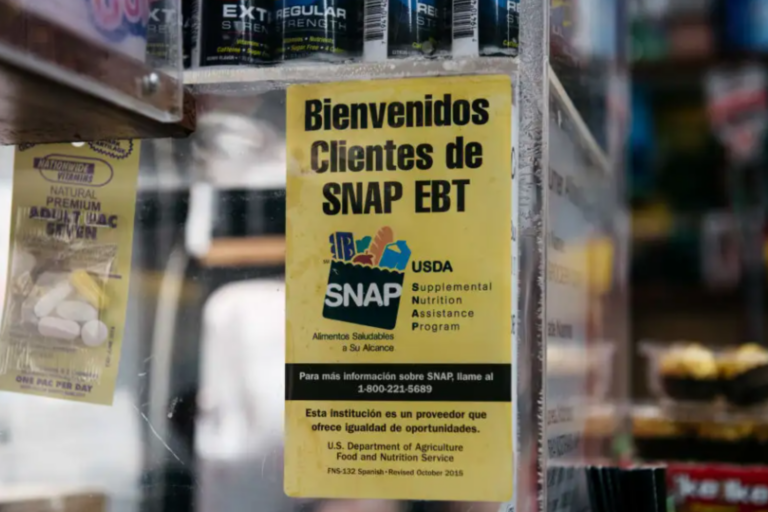
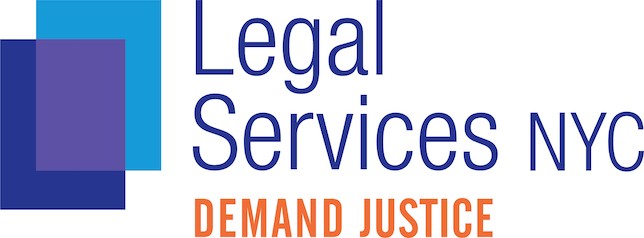

All three groups call on the city to dramatically overhaul busing, implement required transportation accommodations, end egregious delays, and treat students and families with respect.
Roughly 100,000 students with disabilities rely on NYC bus services to get to school.
NEW YORK, NY — Seventeen families of students with disabilities have filed a complaint with the Office of Civil Rights of the federal U.S. Department of Education over discrimination in busing services. The families and their legal representation allege that, for decades, the NYC Department of Education (DOE) has engaged in systemic discrimination against students with disabilities by routinely denying them access to legally-required bus transportation and other accommodations, in violation of federal civil rights law, causing students to lose out on valuable class time and after-school programs, and endure unreasonably long transit times, among other injuries. The families are represented by Mobilization for Justice (MFJ), Legal Services NYC (LSNYC), and New York Legal Assistance Group (NYLAG), and joined by community-based groups including Citywide Council on Special Education, Parents to Improve School Transportation (PIST) NYC, the Education Council Consortium, and Timon Family Services.
“He likes going to school so much,” said the parent of one 8-year-old boy with autism in Manhattan, who could not attend school for weeks due to a lack of busing, leaving the parent to hire a babysitter out of pocket for $800. “He would say, ‘I was supposed to go to school. I want to go to school, Mommy.’ I would say I don’t have the bus. He tried to put his shoes on, his bookbag. Got his pens, everything.“It’s gone from worse, to worse, to even worse,” said the parent of another student included in the complaint. “When it comes to the DOE, they are not supportive.”
Read the complaint here.
Student F—a 17-year-old Hispanic student in Brooklyn with autism, epilepsy, a bleeding disorder, and other conditions, attending a District 75 specialized school—is supposed to receive daily busing with accommodations. However, F has received none of these accommodations (including limited travel time, a bus paraprofessional, or even air conditioning). In fact, F has received no busing at all this year. Instead, F and his mother are forced to ride a New York City transit bus for over an hour and 20 minutes one way to get to school. F’s mother must spend more than five hours every day on a city bus.
Student H, a 5-year-old Black, non-verbal student with autism attending first grade at a District 75 school in Manhattan—has received no busing since March 2023. H’s father has been forced to take time off from work to drive her to school each day. Student A, a 9-year-old Black student from Queens with impairments including ADHD and attending fifth grade at a non-public school, had no busing for 15 days. During that time, A’s father—who works overnight as an emergency medical technician—was also forced to drive A to school in the morning. Student C, a 10-year-old South Asian student with autism from Queens, was forced to spend more than two hours and 15 minutes for a one-way ride to his school—despite having a limited travel time requirement. He was on the bus for so long that he would often urinate on himself. Other times he has become sick and vomited on himself.
The families and advocates are calling on the U.S. Department of Education’s Office of Civil Rights to investigate the NYC DOE’s discriminatory transportation policies and practices and require the department to provide consistent, daily, and timely transportation to and from school. Additionally, the groups are calling for timely reimbursements to families who are forced to use private carfare services when buses are late or don’t show, transportation accommodations, consistent communication with families when buses are running late, and for the NYC DOE to appoint an independent ombudsman to monitor and oversee DOE transportation policies and practices.
“Our families and students with disabilities have had enough of interminable bus delays, failure to include required accommodations, and rude, unprofessional treatment from New York City DOE staff,” said Andrew Gerst, Staff Attorney at Mobilization for Justice. “We have heard these stories for years. It is time for the U.S. Department of Education to ensure that no families of students with disabilities have to suffer this type of treatment again.”
“The DOE’s woefully inadequate busing and school transportation practices are disproportionately impacting students with disabilities, exposing them to longer bus rides, late arrivals or pick-ups from school, and threats to their own safety while on the school bus,” said Tara Foster, an attorney in the Education Rights Project of Legal Services NYC. “This is unacceptable for one of the largest, most well-resourced school systems in the nation. These and all NYC students deserve reliable bus transportation to access essential academic and support services they need to learn. Without it, they will fall further and further behind. The time has come for the U.S. Department of Education’s Office of Civil Rights to enforce the laws intended to protect New York’s most vulnerable students.”
“Specialized transportation services for New York City’s students with disabilities have long been lacking for families throughout our city, but this school year in particular, busing has been atrocious,” said Jessica Selecky, Director of NYLAG’s Special Education Unit. “While many students with disabilities who are receiving special education supports and services are entitled to specialized school transportation services by law, we see firsthand how frequently New York City’s Department of Education fails to fulfill this basic need for our clients, exacerbating existing barriers to learning and creating new ones. We need the U.S. Department of Education’s Office of Civil Rights to intervene and force NYC DOE to provide these students with safe, accessible transportation to and from school, so that the families impacted by this injustice can finally trust that their students will get to school on time, safely and comfortably, without caretakers needing to take additional time away from work—which every family deserves.”
###
About Mobilization for Justice, Inc. (MFJ)
Mobilization for Justice’s (MFJ) mission is to achieve justice for all. MFJ prioritizes the needs of people who are low-income, disenfranchised, or have disabilities as they struggle to overcome the effects of social injustice and systemic racism. We provide the highest-quality free, direct civil legal assistance, conduct community education and build partnerships, engage in policy advocacy, and bring impact litigation. MFJ also promotes diversity, equity, and inclusion in our workplace, and understands the need to eliminate all racial disparities to achieve justice for all. Mobilization for Justice has worked for years with students with disabilities in a wide variety of contexts, including at disciplinary hearings, special education impartial hearings, and IEP meetings.
About Legal Services NYC (LSNYC)
Legal Services NYC fights poverty and seeks racial, social, and economic justice for low-income New Yorkers. For over 50 years, LSNYC has challenged systemic injustices that trap people in poverty and helped clients meet basic needs for housing, income and economic security, family and immigration stability, education, and health care. Our staff of dedicated advocates have deep roots in the communities we serve so New Yorkers and their families can access the services, resources, and protections they need to survive.
About New York Legal Assistance Group (NYLAG)
Founded in 1990, New York Legal Assistance Group (NYLAG) is a leading civil legal services organization combating economic, racial, and social injustice by advocating for people experiencing poverty or in crisis. NYLAG exists because wealth should not determine who has access to justice. Our services impacted the lives of 113,000 people last year.

